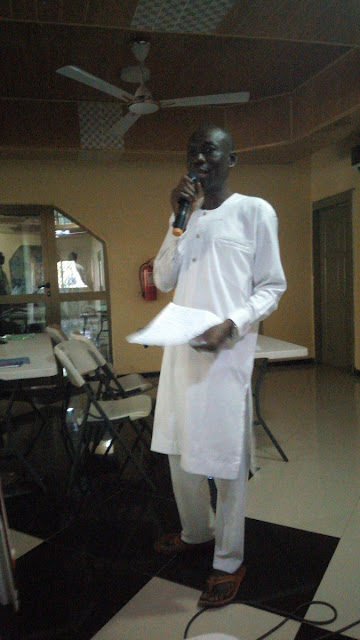CORRUPTION ALLEGATIONS NOT GOOD FOR GHANA'S INT. REPUTATION 21st February, 2019
The Upper East Regional Information
Officer [R.I.O] Mr. Bennin Issifu Douri, has stated that the phenomenon of
frequent allegations of corruption in Ghana, be it actual or perceptive is not
good for the country’s image building and international reputation.
Mr. Bennin noted that no
institution in Ghana be it state or private, is immune to corruption as there
is always the tendency for people to be corrupt unless proper and effective
checks are instituted and allowed to function. He emphasised that “media itself
as a “watchdog”, the public and civil service as well as government and all its
arms, have in one time or the other been hit with allegations of corruption”. To
him, this won’t stop any time soon unless those found culpable in any alleged
case were dealt with in order to send strong signals to anyone contemplating
same.
He made the statement in a
presentation at a two-day training workshop for the media on Service Delivery
Standards and Social Accountability held at the A.A Country Side Hotel in Paga,
capital of the Kassena-Nankana West District, Upper East Region. The Upper East
Chapter of the Ghana Journalists Association [GJA] in partnership with some
civil society groups organised the training funded by Starr Ghana.
 |
| Mr. Bennin Issifu Douri, Regional Information Officer - Upper East making a presentation |
The RIO however observed that
nonetheless, the media plays very critical roles in Ghana’s democratic dispensation
and could not be done without. He therefore charged media to continue to play
its “watchdog” roles fairly, effectively and without fear or favour. He further
called on journalists and other media practitioners to purge themselves so as
to be able to monitor and do efficient and accurate reportage on service
delivery standards in the country. He said the work of the media should bring
to light issues where there are shortfalls so that appropriate authorities can
act in timely manner to remedy the situation.
According to Bennin, aside the
traditional roles of the media, the Ghanaian media performs other vital roles
such as judicial, legislative and executive roles. His explanation is that,
media practitioners especially journalists educate the public on Bills being
discussed in Parliament even before they become law, they report on matters
before the law court and they also report on the actions or inactions of the
Executive. In this regard therefore, the media through its Agenda Setting
functions can either whip-up the public for or against actions, policies or
programmes of government.
Furthermore, he viewed the media as
a strong link between the citizenry and duty bearers mostly takes charge of
Social Accountability affairs by inviting public office holders into FM and TV
studios to answer some queries whilst the public to demand answers through
phone-in sessions. This he noted, makes the ordinary people feel part of the
system as they have access to these platforms to engage their leaders and other
officers paid by the tax payer to provide public goods and services.
Mr. Bennin observed that the
Ghanaian media industry doesn’t pay well, that could not be an excuse for
sub-standard media work. In addition, he said though there had always been
rumours that majority of media establishments were owned politicians,
journalists who choose to work with media outfits, must abide by the ethics of
the profession at all times and also be guided by acceptable moral standards.
A Regional Operations Manager with
the Upper East Regional Directorate of the National Health Insurance Authority
[NHIA], Mr. Kasimu Abudulai, made a presentation on the Free Maternal
Healthcare Policy of Government under the NHIA. He mentioned some objectives of
the policy to include facilitation of access to quality maternal healthcare delivery
services to all mothers, helping to reduce the number of women and children who
die from preventable pregnancy and labour-related problems and also, to encourage
women to seek antennal and postnatal care as well as delivery at healthcare
facilities.
Speaking on how to benefit from the
Policy, Mr. Kasimu disclosed that all a woman needed was a pregnancy
confirmation note from a Medical Officer, Midwife or Nurse and same then
submitted to the NHIS for enrollment under the Policy. He added that women are
required to register and enroll onto the NHIS free of charge in order to benefit
from the Policy.
 |
| U/E GJA Chair, Mr. Eric Amoh [Head Down] at the training |
Upper East Regional Chairman of the
GJA Mr. Eric Amoh in his earlier remarks on the purpose of the training
revealed that the GJA and some partners in the Civil Society arena including
ACDEP, RISE Ghana and the Presby Health-North together submitted a proposal to
Starr Ghana in 2018 for funding to help roll out programmes in aid of the
country’s pro-poor policies such as the Health Insurance Scheme, maternal
health, the LEAP and the fertilizer subsidy intervention. Some funds were accordingly
released for the purpose and that culminated in the training for journalists
from within the region.
Mr. Amoh held that, the role of the
media in all of these was to play oversight on the implementing agencies and
personnel to keep them in check and to ensure that, the target beneficiaries
actually taste the fruits of these interventions.



.jpeg)
Comments